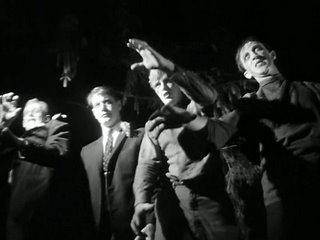 Carlos Menem in Argentina, Daniel Ortega in Nicaragua, Alan García in Peru, Gonzalo Sánchez de Losada in Bolivia... These are just some of the political undead who have stalked the region's politics in the past few years, often somewhere in the penumbra living a colourful highlife of exile while charges or even convictions mount up in absentia. But as soon as there is word of an upcoming ballot, back they come sniffing around like dogs returning to their vomit, to make many a presidential poll a rerun of Night of the Living Dead.
Carlos Menem in Argentina, Daniel Ortega in Nicaragua, Alan García in Peru, Gonzalo Sánchez de Losada in Bolivia... These are just some of the political undead who have stalked the region's politics in the past few years, often somewhere in the penumbra living a colourful highlife of exile while charges or even convictions mount up in absentia. But as soon as there is word of an upcoming ballot, back they come sniffing around like dogs returning to their vomit, to make many a presidential poll a rerun of Night of the Living Dead.(Javier Corrales points out that the only countervailing tendency is the election of complete newcomers to political power: he shows that of 29 presidential elections in 17 countries since 1996, "eleven featured former presidents who obtained a third place or higher" while twelve "featured complete newcomers" who likewise "obtained a third place or higher.")
Himself once one of the surprise neophyte winners, the latest of these former presidents who really should know better is Peru's Alberto Fujimori. President from 1990 until 2000 (a decent potted biography is available here), when he scarpered to Japan in November of that year, his regime in crisis with daily revelations of corruption and the lurid misadventures of his spy chief and advisor Vladimiro Montesinos. When, in rather undignified fashion, Fujimori attempted to submit his resignation from Japan by fax (rather like dumping someone by text message), the Peruvian Congress finally took sufficient umbrage instead to sack him themselves, for being "morally unfit" to govern.
 For the past five years, Fujimori has been hanging out in Tokyo, most recently living in his new girlfriend's hotel, spending up to 12 hours a day on the internet and taking advantage of the fact that there is no extradition treaty between Peru and Japan.
For the past five years, Fujimori has been hanging out in Tokyo, most recently living in his new girlfriend's hotel, spending up to 12 hours a day on the internet and taking advantage of the fact that there is no extradition treaty between Peru and Japan.But too much time online can warp the mind... He has been making noises suggesting he wanted to return to Peru. Not, needless to say, to face the various charges brought against him; rather, to contest the 2006 elections and (one presumes) resume power where he had so abruptly left off in 2000.
To this purpose, he has been broadcasting radio shows for diffusion within Peru, setting up some kind of transpacific political infrastructure, and maintaining a trilingual website from which he can rebut attacks and denounce his attackers. At the bottom of every page is a little Flash gizmo that first shows us former Sendero head Abimael Guzmán, crossed out in red ink, and the words "Defeat of Terrorism"; then the acronyms APEC, IFM (IMF), World Bank, and the message "Re-insertion into the International Financial Community." This is, one takes it, what he would like us to remember of his presidency. Not, for instance, the suspension of Congress and civil rights, the massacres, the personalist control through bribery...
 Along with two others, my friend and colleague Max Cameron has started up a blog on the 2006 Peruvian elections, a blog which of necessity, and especially given Fujimori's surprise arrival in Chile and subsequent arrest there, has become increasingly a blog about the former president, his ambitions, and the rumours and responses to his activities.
Along with two others, my friend and colleague Max Cameron has started up a blog on the 2006 Peruvian elections, a blog which of necessity, and especially given Fujimori's surprise arrival in Chile and subsequent arrest there, has become increasingly a blog about the former president, his ambitions, and the rumours and responses to his activities. Though much of the blog is a clearing house of information culled from the Peruvian press and NGOs (usually, but not always, in Spanish), Max himself has contributed some analysis on "Return of Fujimori" and "The Trouble with Alberto". Go read it.
For what it's worth, Fujimori's own political project is a more or less standard neoliberalism, and his style is very much the neoliberal anti-politics of all things to all men (and women). He's a shapeshifter: arriving on the political scene in 1990 as an unknown agronomist facing off against the flamboyant novelist Mario Vargas Llosa he seemed to be an empty, characterless vessel into which the electorate could pour their own hopes and desires. Precisely because he can seem so unassuming, his Spanish relatively slow and apparently devoid of fluency or rhetoric, and also because of the stereotype that saw "el chino" as inscrutably and demurely Asiatic, for a long time what Max terms his "immoderate ambition" and "the depth of his indifference toward the rule of law" could be overlooked.
Even so, the return of this zombie even to the margins of political respectability rather boggles the mind. It's surely not that he seeks redemption--for which contrition would be a pre-requisite.
It is, however, another sign that despite the obvious (political, moral, and often enough also literally economic) bankruptcy of neoliberalism in Latin America, no real alternative has yet emerged to replace it. Individual countries and regimes have come up with more or less patchwork post-neoliberal orders, from Kirchner's social democracy in Argentina to Chávez's telepopulism in Venezuela (and Lula's rebranding of the same old policies with Workers Party tags in Brazil), but they each have a rather rickety and ramshackle air.
We're in the interregnum. And to steal a quotation from More Better Analysis:
The crisis consists precisely in the fact that the old is dying and the new cannot be born: in this interregnum, morbid phenomena of the most varied kind come to pass.So while the crisis persists, we'll continue to be haunted by these undead ghouls from the past. But there are also some specters of a possible future around, not least in Peru's neighbour, Bolivia. In the meantime, though, we might want to keep a sharp eye around us in the dark nights and grey days of Lima's coastal fog.

No comments:
Post a Comment